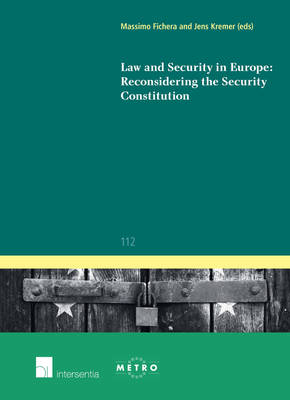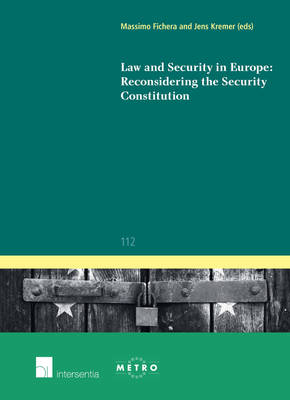
- Retrait gratuit dans votre magasin Club
- 7.000.000 titres dans notre catalogue
- Payer en toute sécurité
- Toujours un magasin près de chez vous
- Retrait gratuit dans votre magasin Club
- 7.000.0000 titres dans notre catalogue
- Payer en toute sécurité
- Toujours un magasin près de chez vous
Law and Security in Europe: Reconsidering the Security Constitution
Volume 112
Massimo Fichera, Jens Kremer
63,00 €
+ 126 points
Description
This collection of essays is divided in two parts. In the first part of the book, security is considered from a theoretical angle, as a phenomenon that has become an integral part of modern society and inevitably interacts with law in many ways. The analysis emphasizes the ambiguity of the notion of security and its tendency to expand and affect simultaneously different fields of law. Depending on the adopted approach, security can be understood in many different terms and through various concepts: inter alia through exceptionality, from a constructivist viewpoint, or as human security. Whereas, for example, an 'existential' approach takes risk and danger as a fact of life and is based on the assumption of the fragility of the human condition, leading to traditional and military understandings of security, a constructivist approach regards security as a discursive speech act enabling criticism of security claims. Analyzing security in connection with law highlights both tensions and contradictions. From classical analysis on states of emergency to new conceptualizations of security as a specific dimension within the process of European integration ('the European Security Constitution'), legal approaches to security and law today are facing many paradoxes and challenges. The second part of the book considers some of these security dilemmas in two specific areas of law: human rights and criminal law. Here, the book addresses the militarization of the fight against terrorism, the distinction between administrative and penal sanctions, the limits of intelligence activities, and the scope of criminalization. Bringing together scholars from different fields of law, focusing on security from particular perspectives, the book will appeal to constitutional, criminal, international, and EU lawyers who are interested in both theoretical and practical aspects of the relationship between security and law. (Series: Ius Commune Europaeum - Vol. 112)
Spécifications
Parties prenantes
- Auteur(s) :
- Editeur:
Contenu
- Nombre de pages :
- 253
- Langue:
- Anglais
- Collection :
Caractéristiques
- EAN:
- 9781780681474
- Date de parution :
- 27-03-13
- Format:
- Livre broché
- Format numérique:
- Trade paperback (VS)
- Dimensions :
- 172 mm x 236 mm
- Poids :
- 510 g

Les avis
Nous publions uniquement les avis qui respectent les conditions requises. Consultez nos conditions pour les avis.






